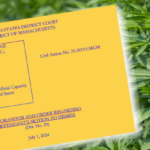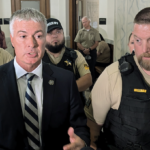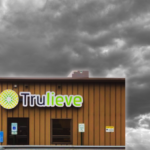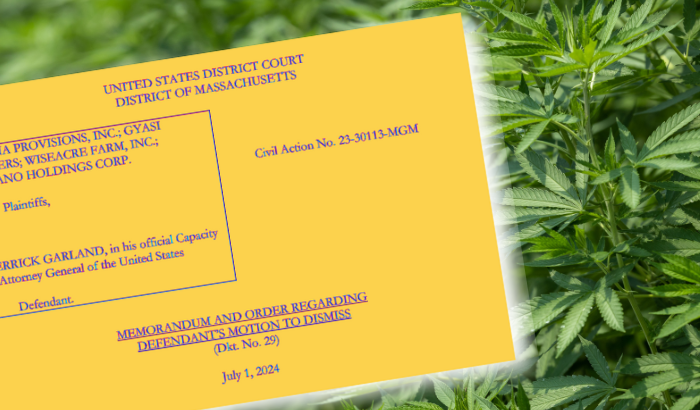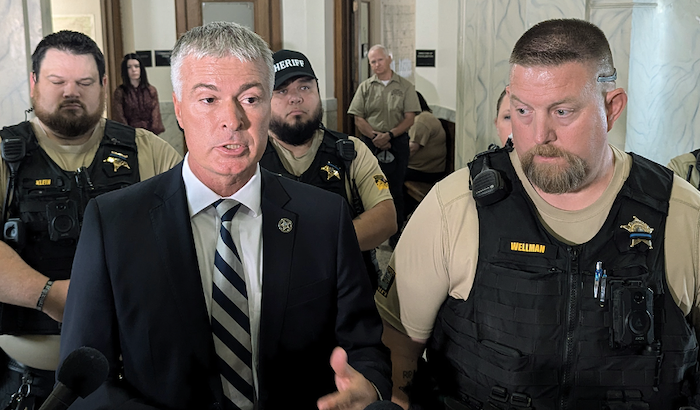
The question on decriminalizing some psychedelics as a therapeutic option has flown under the radar
Voters will weigh in on a slew of ballot questions this November, with the competing sides raising and spending millions of dollars trying to convince them which way to vote on everything from whether to get rid of the MCAS graduation requirement to whether to legalize psychedelic mushrooms.
But who is behind the barrage of spending aimed at persuading voters will be largely a mystery until weeks before the election. In contrast to state election laws governing candidates for office, which require regular reporting throughout the year on campaign donations and expenditures, ballot question committees operate under relatively lax reporting requirements.
Under state law, ballot campaigns don’t have to report on the fundraising and spending they’ve undertaken all year until early September, only weeks before voters weigh in on November 5 – or even sooner for those who cast a ballot during early voting, which begins October 19.
In an era of multimillion-dollar spending on ballot questions, the looser reporting requirements for their campaign committees make no sense, says Geoff Foster, the head of Common Cause Massachusetts, a nonpartisan advocacy group that promotes greater government transparency and voting reforms.
“Voters have a right to know who is trying to influence the outcome of an election, and with Massachusetts ballot questions inviting huge amounts of money from both in-state and out-of-state, more frequent reporting requirements and earlier deadlines for reporting would strengthen democracy by making the public aware sooner in the process,” said Foster.
Over the last 20 years, ballot questions have become an expensive way for activists to change state policy – often bankrolled by deep-pocketed interests that operate largely in the shadows. The threat of a ballot question is sometimes used to prod the Legislature to act, as was the case with health care reform in 2008 and increasing the minimum wage in 2018. When that doesn’t work, activists have followed through by asking voters to push through a new law, such as the legalization of marijuana in 2016.
The heavyweights behind ballot campaigns and super PACs – another source of campaign spending with looser requirements – tend to be unions and business interests, as well as wealthy individuals. In California, rideshare app companies spent $200 million in 2022 on the question of whether drivers are independent contractors, which voters approved.
Both unions and business-linked interests have a history of secrecy when it comes to campaign finance. Massachusetts campaign finance regulators leveled a $426,000 fine – the largest in their history – against Families for Excellent Schools, which was involved in the unsuccessful 2016 ballot question to lift the cap on charter schools. Regulators accused the group of seeking to disguise its money trail, and forced it to reveal donors who hailed largely from the financial sector.
On the other side, a teachers union was hit with a similar accusation, as it sought in 2013 to boost Marty Walsh, then a labor leader and state representative, who won the open race for Boston mayor. The matter involved the American Federation of Teachers, the national umbrella union for the Boston Teachers Union, which supported a pro-Walsh super PAC, which operated without fundraising and spending restrictions.
Along with questions on MCAS and the use of psychedelics in mental health therapy, the
November ballot is expected to feature a variety of questions on auditing the Legislature and setting a higher minimum wage for tipped workers.
A ballot question that looked poised to command a lot of attention – and spending – this cycle is now off the table. Uber and Lyft were pushing a proposal to ensure app-based drivers remained treated as independent contractors. But the app companies last week reached a $175 million settlement with the attorney general’s office, an agreement that stated the companies would not pursue their ballot question.
The future of a related potential ballot question, backed by labor leaders, that would allow drivers to unionize, with SEIU 32BJ as the primary backer, remains unclear. The app companies did not say whether they would mount an opposition campaign against the union measure, and union leaders appear hopeful that state lawmakers can step in and pass a bill so they can avoid an expensive ballot fight.
In contrast with ballot committees, statewide and legislative candidates file campaign finance monthly. Ballot campaigns are required to disclose their top five donors in ads, though the names sometimes appear in small type. And details on television ad spending can be found on the cumbersome Federal Communications Commission’s website. But comprehensive information on ballot question fundraising and spending, which can be parsed through reports available on the website of the state’s Office of Campaign and Political Finance, won’t be available until September 6.
Reports filed earlier this year, covering fundraising and spending in 2023, offered some indication of what the campaigns have pulled in for start-up costs, and whether they covered legal services or paid signature-gathering.
With the MCAS question, the Massachusetts Teachers Association has expended resources in pushing the effort onto the ballot, while the opponents, the Committee to Preserve Educational Standards for K-12 Students, have not yet filed any reports because the organization only formed in January. The opposition campaign said its coalition includes business groups and parents, among other groups.
State Auditor Diana DiZoglio is the main proponent of the bipartisan audit-the-Legislature question, which state lawmakers have derided as a “power grab” by the Methuen politician. A ballot committee to oppose the question has yet to form.
Then there’s the ballot question on decriminalizing some psychedelics as a therapeutic option, which has flown under the radar as the now-defunct Uber/Lyft measure and other questions have drawn more coverage. The committee behind the measure pulled in $3 million in 2023 and spent nearly as much, including a hefty sum towards Dewey Square Group, a powerhouse political consulting and strategy firm with close ties to Democratic Party politics. The committee opposing the measure is chaired by a Massachusetts General Hospital surgeon.
Donors to the proponents have included the company behind Dr. Bronner’s soaps and a top executive at software company Hubspot.
Eliza Dushku, the Boston-born actress who starred in “Buffy the Vampire Slayer,” was also listed among the donors, kicking in $100,000 to the effort. The proponents’ fundraising filing for 2023 listed her address as the same one as that of the real estate company run by her husband, Peter Palandjian. Her occupation is listed as “student.”
With Beacon Hill busy with its end-of-session pileup of bills on housing, economic development and climate change, there does not appear to be much bandwidth for strengthening the reporting requirements for ballot question committees. Whether there would be an appetite for considering changes next session is unclear.
But the co-chair of the Joint Committee on Election Laws acknowledged the disparity between requirements for candidates and ballot questions committees, and suggested he was open to the idea of reforms.
The more transparent the process, said Sen. John Keenan, a Quincy Democrat, “the better it is for everybody, particularly for voters so they get a clear sense of the money behind the ballot questions.”
This article was republished from CommonWealth Beacon. You can read the original version here.





